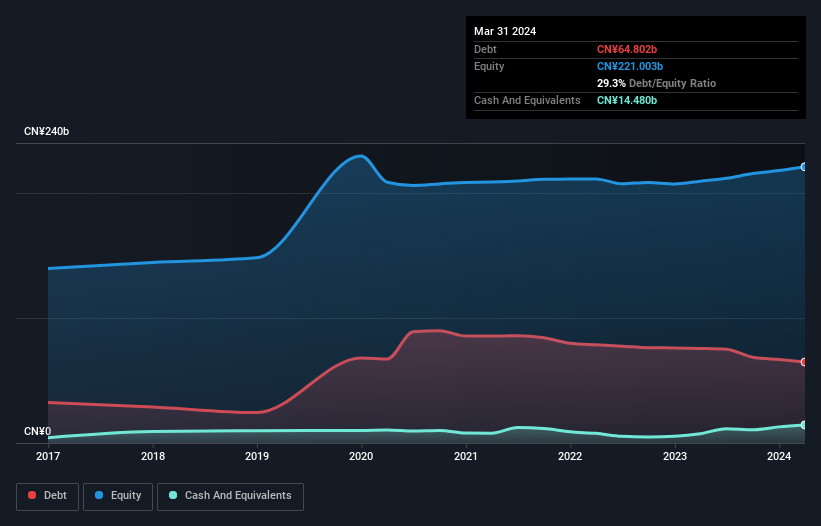- China
- /
- Transportation
- /
- SHSE:601816
Here's Why Beijing-Shanghai High-Speed Railway (SHSE:601816) Can Manage Its Debt Responsibly
Warren Buffett famously said, 'Volatility is far from synonymous with risk.' So it might be obvious that you need to consider debt, when you think about how risky any given stock is, because too much debt can sink a company. We can see that Beijing-Shanghai High-Speed Railway Co., Ltd. (SHSE:601816) does use debt in its business. But is this debt a concern to shareholders?
When Is Debt A Problem?
Debt and other liabilities become risky for a business when it cannot easily fulfill those obligations, either with free cash flow or by raising capital at an attractive price. If things get really bad, the lenders can take control of the business. However, a more common (but still painful) scenario is that it has to raise new equity capital at a low price, thus permanently diluting shareholders. Of course, plenty of companies use debt to fund growth, without any negative consequences. The first step when considering a company's debt levels is to consider its cash and debt together.
See our latest analysis for Beijing-Shanghai High-Speed Railway
What Is Beijing-Shanghai High-Speed Railway's Debt?
The image below, which you can click on for greater detail, shows that Beijing-Shanghai High-Speed Railway had debt of CN¥64.8b at the end of March 2024, a reduction from CN¥75.7b over a year. However, it does have CN¥14.5b in cash offsetting this, leading to net debt of about CN¥50.3b.

A Look At Beijing-Shanghai High-Speed Railway's Liabilities
According to the last reported balance sheet, Beijing-Shanghai High-Speed Railway had liabilities of CN¥14.4b due within 12 months, and liabilities of CN¥58.0b due beyond 12 months. Offsetting these obligations, it had cash of CN¥14.5b as well as receivables valued at CN¥2.34b due within 12 months. So it has liabilities totalling CN¥55.5b more than its cash and near-term receivables, combined.
This deficit isn't so bad because Beijing-Shanghai High-Speed Railway is worth a massive CN¥257.3b, and thus could probably raise enough capital to shore up its balance sheet, if the need arose. But we definitely want to keep our eyes open to indications that its debt is bringing too much risk.
We use two main ratios to inform us about debt levels relative to earnings. The first is net debt divided by earnings before interest, tax, depreciation, and amortization (EBITDA), while the second is how many times its earnings before interest and tax (EBIT) covers its interest expense (or its interest cover, for short). The advantage of this approach is that we take into account both the absolute quantum of debt (with net debt to EBITDA) and the actual interest expenses associated with that debt (with its interest cover ratio).
Beijing-Shanghai High-Speed Railway's net debt of 2.1 times EBITDA suggests graceful use of debt. And the alluring interest cover (EBIT of 8.5 times interest expense) certainly does not do anything to dispel this impression. Notably, Beijing-Shanghai High-Speed Railway's EBIT launched higher than Elon Musk, gaining a whopping 319% on last year. When analysing debt levels, the balance sheet is the obvious place to start. But it is future earnings, more than anything, that will determine Beijing-Shanghai High-Speed Railway's ability to maintain a healthy balance sheet going forward. So if you want to see what the professionals think, you might find this free report on analyst profit forecasts to be interesting.
Finally, a business needs free cash flow to pay off debt; accounting profits just don't cut it. So we always check how much of that EBIT is translated into free cash flow. Over the last three years, Beijing-Shanghai High-Speed Railway actually produced more free cash flow than EBIT. That sort of strong cash generation warms our hearts like a puppy in a bumblebee suit.
Our View
The good news is that Beijing-Shanghai High-Speed Railway's demonstrated ability to convert EBIT to free cash flow delights us like a fluffy puppy does a toddler. And that's just the beginning of the good news since its EBIT growth rate is also very heartening. Zooming out, Beijing-Shanghai High-Speed Railway seems to use debt quite reasonably; and that gets the nod from us. After all, sensible leverage can boost returns on equity. There's no doubt that we learn most about debt from the balance sheet. But ultimately, every company can contain risks that exist outside of the balance sheet. For instance, we've identified 1 warning sign for Beijing-Shanghai High-Speed Railway that you should be aware of.
When all is said and done, sometimes its easier to focus on companies that don't even need debt. Readers can access a list of growth stocks with zero net debt 100% free, right now.
Valuation is complex, but we're here to simplify it.
Discover if Beijing-Shanghai High-Speed Railway might be undervalued or overvalued with our detailed analysis, featuring fair value estimates, potential risks, dividends, insider trades, and its financial condition.
Access Free AnalysisHave feedback on this article? Concerned about the content? Get in touch with us directly. Alternatively, email editorial-team (at) simplywallst.com.
This article by Simply Wall St is general in nature. We provide commentary based on historical data and analyst forecasts only using an unbiased methodology and our articles are not intended to be financial advice. It does not constitute a recommendation to buy or sell any stock, and does not take account of your objectives, or your financial situation. We aim to bring you long-term focused analysis driven by fundamental data. Note that our analysis may not factor in the latest price-sensitive company announcements or qualitative material. Simply Wall St has no position in any stocks mentioned.
About SHSE:601816
Beijing-Shanghai High-Speed Railway
Beijing-Shanghai High-Speed Railway Co., Ltd.
Undervalued with excellent balance sheet and pays a dividend.
Market Insights
Community Narratives



